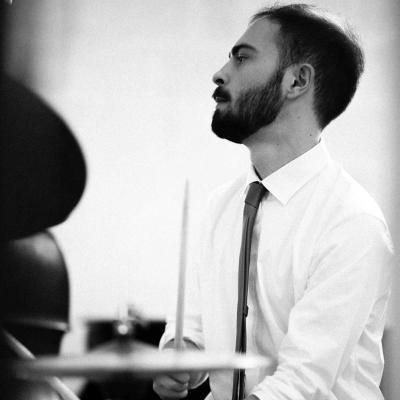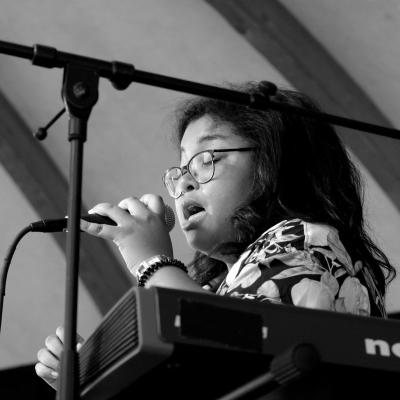Learning music with Apolline
Learning music with Apolline
According to Immanuel Kant, "Music is the language of emotions". For us, music is a universal language, a direct connection with our strongest emotions. Music has multiple benefits, enabling children to create brain connections important for development, sharpening sensitivity and teaching the rigor of long-term learning. After all, what could be more beautiful than mastering an instrument? At Apolline, we offer a variety of music courses for students of all levels, from beginners to more advanced musicians. We offer courses in singing, guitar, piano, drums, bass and MAO, all taught by our experienced teachers. We also believe that music becomes more beautiful when it's shared, which is why we encourage our most motivated students to play in group workshops, and then discover the world of live performance, with recording sessions in professional studios and concert tours at the end of the day. Don't wait any longer, let yourself be tempted by the instrument of your choice and join our School of the Arts to benefit from rigorous and passionate teaching.
Based in Lausanne, Apolline offers courses in guitar, piano, drums, bass, MAO and vocals, as well as contemporary music workshops. Find out more about our different courses
Learn more
what age are music lessons for?
Music lessons are available for all ages, from beginners for the very young to adults who wish to deepen their musical knowledge. At Apolline, we offer courses for beginners, intermediates and advanced students. Learning music can start as early as age 4 or 5 with introductory classes, which focus on exploring different instruments and learning the basics of music. However, there is no age limit for starting to learn music. In fact, many adults choose to take music classes to deepen their musical knowledge and practice.
What are the basics of music?
The basics of music include several elements, such as music theory, note reading, instrument practice and understanding the different levels of music. In terms of music theory, this involves learning concepts such as scales, chords, intervals and keys. Understanding these concepts enables musicians to understand how notes work together to create a melody. Note reading is also a key skill in music making. Musicians need to be able to read the notes on a score in order to play the right melody. Instrument practice is another essential element for beginners. Musicians need to learn the basics of their instrument, such as holding the instrument, playing technique, posture and so on. Finally, understanding the different levels of music, such as genres and styles, is important for musicians to understand musical diversity. In short, the basics of music include learning music theory, reading notes, playing instruments and understanding the different levels of music. These elements are essential for learning music and progressing in its practice.
Does Ecole Apolline award a diploma to successful students?
There is no particular diploma awarded to students throughout their apprenticeship, like at the conservatory, for example. In fact, Apolline's approach to learning is based on the pleasure of progress, not on performance. That's why we don't organize exams, and why there are no diplomas. Every year, we organize a festival in the school's colors: the Apolline Fest. You can read our article on this subject. Any student who wants to can sign up and perform in front of an audience of friends and family. It's a great opportunity to showcase all the work accomplished during the year. Our teachers often write letters of recommendation for students to help them achieve their goals. What's more, for experienced students, our teachers offer a professionalizing curriculum to prepare motivated students for art school entrance exams, or even the conervatoire. All our music teachers have an arts school diploma.
Can students perform in concert?
At Apolline, we organize workshops for the most motivated students who wish to discover group playing. In this context, we encourage our students to perform in concert, particularly in bars/clubs in the city of Lausanne and at the annual Apolline Fest. This program is not suitable for beginners, but rather for students who have already mastered their instrument to some extent. A workshop room with good acoustic treatment is provided to enable students to play in the best possible conditions. We'll also be teaching them stage presence and the specific codes of the performing world. We take care to ensure that the pieces chosen appeal to everyone, so as to guarantee an enriching experience combining pleasure, high standards and progress.
What kind of apprenticeship does Apolline offer?
How do you get away from the usually rigid framework of the first years of musical training found in most Swiss schools? Based in the heart of Lausanne, the Apolline School of the Arts has a different philosophy. Rather than offering individual lessons to children and teenagers, the emphasis is on small groups - of 2 or even 3 students, depending on the instrument. Working in a group offers many advantages for beginners and inexperienced students. To find out more, see our article on private VS semi-private music lessons. What's more, Apolline offers its students the possibility of joining a group workshop, in addition to the basic instrument course, to enable them to play with other musicians of their own age. Accompanied by a teacher, they learn to play together, through covers or their own compositions.
What is the right age for solfege?
Solfege can be taught from the age of 5 or 6, as this is the age at which children begin to develop their auditory skills and musical memory. However, it's important to note that the ideal age to start solfeggio can vary according to the child and his or her musical development. Some children may start earlier, while others may need to wait a little longer before beginning solfeggio. In any case, it's important not to force children to start solfeggio too early, as this could discourage them from music. It's best to start with playful musical activities to stimulate their interest and enjoyment of music, then gradually introduce music theory according to their level of musical development.
What's the best music to work to?
The choice of music for work depends largely on each individual's personal preferences. However, some studies have shown that certain types of music can be more beneficial than others for concentration and productivity. Jazz and classical music are often considered beneficial for concentration and productivity. Jazz, with its rhythmic and harmonic variations, can help stimulate creativity and motivation. Classical music, particularly Baroque, often has a slow, even tempo, which can help reduce stress and improve concentration. The piano is an instrument often featured in classical music and can also be used to create an atmosphere conducive to concentration and creativity. On the other hand, rock and popular music can be distracting for some people due to their fast pace and intensity. However, this also depends on individual musical tastes. Ultimately, the best music to work to is the kind that helps you concentrate and feel motivated. It can be useful to experiment with different genres and styles of music to find the one that works best for you.
What is a stringed instrument?
A string instrument is a type of musical instrument that produces sound by vibrating stretched strings. The strings are either rubbed with a bow, plucked with the fingers or struck with mallets. The most common stringed instruments are the violin, viola, cello and double bass. Stringed instruments can also include instruments such as the guitar, harp and banjo, which have plucked rather than bowed strings. The flute, on the other hand, is not considered a stringed instrument, as it produces sound by vibrating air through a tube, rather than strings. String instruments are often used in orchestras, where they can play an important role in creating melody and harmony. String instruments can also be used solo or in small ensembles, as in the case of a string quartet. Keyboard instruments, such as the piano, may also have strings inside the instrument, but are not considered stringed instruments because they produce sound by striking keys rather than by rubbing or plucking strings.
Are music classes held elsewhere than in Lausanne?
Music classes are indeed held in Lausanne, at Rue de Genève 46. Given the popularity of our activities, it's not out of the question for us to open classes in other towns in French-speaking Switzerland, such as Geneva, Fribourg and Neuchâtel. For the time being, our studios on the rue de Genève are well-equipped and enable our teachers to teach in the best possible environment to deliver quality work.
What information do I need to know before starting my first lesson?
Before you start your first music lesson at Apolline, it's important to have some basic information. Here are a few things to consider: The instrument: It's important to know which instrument you want to learn to play. If you're not sure what you want to play, you can ask your teacher for advice, or research different instruments to see what appeals to you most. Level: It's also important to know what level you're at. If you're a beginner, you'll need a beginner's course to learn the basics. If you already have some experience, you can choose a course that matches your current level. At Apolline, level is of little importance. Goals: It's important to know what your goals are. What do you want to achieve with your music course? Do you just want to learn to play for fun, or do you have bigger ambitions, such as playing in a band or recording an album? Practice: Practice is essential to progress in music. You'll need to devote time and energy to practicing regularly and improving your technique. So it's important to have an idea of the commitment involved before you start your first lesson. Equipment: Depending on the instrument you've chosen, you'll need certain equipment to start playing. For example, if you're starting out on guitar, you'll need a guitar and a pick. If you're starting out on the piano, you'll need a keyboard or a piano.
What role does music theory play at Apolline?
As mentioned above, our aim is to include music theory as part of the instrument's learning process, without teaching it in an indigestible and uninteresting way, as can be the case in other structures such as conservatories. We include music theory sparingly, so that what is learned is relevant to learning the instrument. It would be a shame for your child to be put off by music because of music theory, because music is a vast field of discovery.
How old do I have to be to start playing guitar?
There is no minimum age to start learning the guitar at Apolline. Children can enroll from an early age, although we recommend waiting until 6 to start. It's important to remember that playing any instrument is a musical process that takes time and patience. We obviously encourage adults to take the plunge, bearing in mind that it may require more time and determination than for children. Whatever the age of the learner, Apolline's guitar tuition focuses on the learner's enjoyment and motivation, encouraging creativity and a love of music.
What's the difference between an orchestra and a band?
The main difference between an orchestra and a band is instrumentation. An orchestra is generally made up of musicians playing classical instruments such as violins, violas, cellos, double basses, flutes, clarinets, oboes, bassoons, trumpets, horns, trombones, tubas and percussion. Orchestras may also include choirs or vocal soloists. A band, on the other hand, generally uses a more varied instrumentation, often centered around guitar, bass, drums and vocals. Bands may also include instruments such as keyboard, saxophone, trumpet and percussion, but their instrumentation is generally more limited than that of an orchestra. The purpose and style of music may also differ between the two. Orchestras are often associated with classical music, but can also play contemporary or film music. Bands, on the other hand, are often associated with popular genres such as rock, jazz, blues or pop. Finally, both groups can vary in size. An orchestra can have dozens or even hundreds of members, while a band can have as few as two or three.
What is a group workshop?
A group workshop is a music-learning activity involving a group of people playing music together under the guidance of a teacher or experienced musician. The aim of the group workshop is to learn to play music as a group, to develop listening and interpretation skills, and to foster musical creativity. Group workshops can be organized for all skill levels, from beginner to expert, and for all musical genres, from classical to jazz, popular or traditional music. Participants can play a variety of instruments, including guitar, bass, drums, keyboard, brass, strings and voice. Group workshops can also include aspects of music theory, arranging, improvisation and recording. The benefits of group workshops include developing listening and performance skills, learning group playing techniques, building self-esteem and socializing with other musicians. At Apolline, we encourage our students to take part, as group playing is an essential part of learning music.
What career path for a musician?
A musician's career plan can vary according to personal and professional goals. Here are some typical steps musicians can take to develop their careers: Acquire a musical education: Many musicians begin by taking music lessons at a music school or university. Learning music theory, instrumental practice and public performance is essential to becoming a competent musician. Performing in public: Musicians should play in public as much as possible to develop their performance experience. This can include gigs in bars, clubs, music festivals, churches, weddings or corporate events. Recording music: Musicians can record their music in the studio to create albums or singles. This can also include creating music videos for online distribution. Building a network: Musicians need to build a network of contacts in the music industry, including producers, artistic directors, managers, agents, promoters and other musicians. Find opportunities: Musicians should seek out opportunities to perform and record their music, including music competitions, auditions, concert offers, collaborations with other musicians, etc. Promote your music: Musicians should promote their music to the public and music industry professionals using social networks, music streaming platforms, websites, blogs and media interviews. Develop a long-term career: Musicians can specialize in a certain musical genre, become music teachers, composers, arrangers, producers or artistic directors. It's important to note that a musician's career can be unpredictable and challenging. So it's essential to stay passionate and work hard to succeed in this competitive industry.
What's the difference between the Conservatoire and Apolline?
The Conservatoire and Apolline are both arts schools that offer music courses, but they can have significant differences in their educational approach, training programs and philosophy. The Conservatoire is a traditional school that focuses on learning classical music and generally has structured, formal programs. You can study classical instruments such as the violin, the flute,... Students can take courses in music theory, solfège, performance and composition. Conservatory students are generally required to pass regular examinations to prove their musical competence, and can prepare for a professional career in classical music. On the other hand, Apolline can take a more flexible and creative approach to teaching music. It can offer courses more tailored to the student and his or her musical interests, rather than a standardized program. Apolline can also offer music courses in a variety of musical genres, from classical to jazz, rock and pop. In short, the Conservatoire can be more traditional and formal, while Apolline can be more flexible and creative in its educational approach. Both schools can offer high-quality musical education, but students should consider their own musical goals and preferences before choosing an arts school.
Prices
| Cours | Durée | Prix mensuel* | Prix unique** |
|---|---|---|---|
| Enfants et adolescents (moins de 18 ans) : | |||
| Semi-Privé - 2 élèves | 40 minutes | 111.00 CHF | 1'250.00 CHF |
| Enfants et adolescents (moins de 18 ans) : | |||
| Privé | 30 minutes | 149.00 CHF | 1'690.00 CHF |
| Privé | 40 minutes | 166.00 CHF | 1'890.00 CHF |
| Privé | 50 minutes | 179.00 CHF | 2'090.00 CHF |
| Adultes (dès 18 ans) : | |||
| Privé | 30 minutes | 166.00 CHF | 1'890.00 CHF |
| Privé | 40 minutes | 175.00 CHF | 1'990.00 CHF |
| Privé | 50 minutes | 189.00 CHF | 2'190.00 CHF |
* 12 mensualités à payer de septembre à août (voir notre règlement).
** Prix pour le paiement des cours de l'année complète en un seul versement.
Prix valablent pour une inscription annuelle (cours de septembre à juin). Tous les frais sont compris dans les prix affichés. Inscription en cours d'année possible (calcul du prix au prorata du nombre de cours restants)



